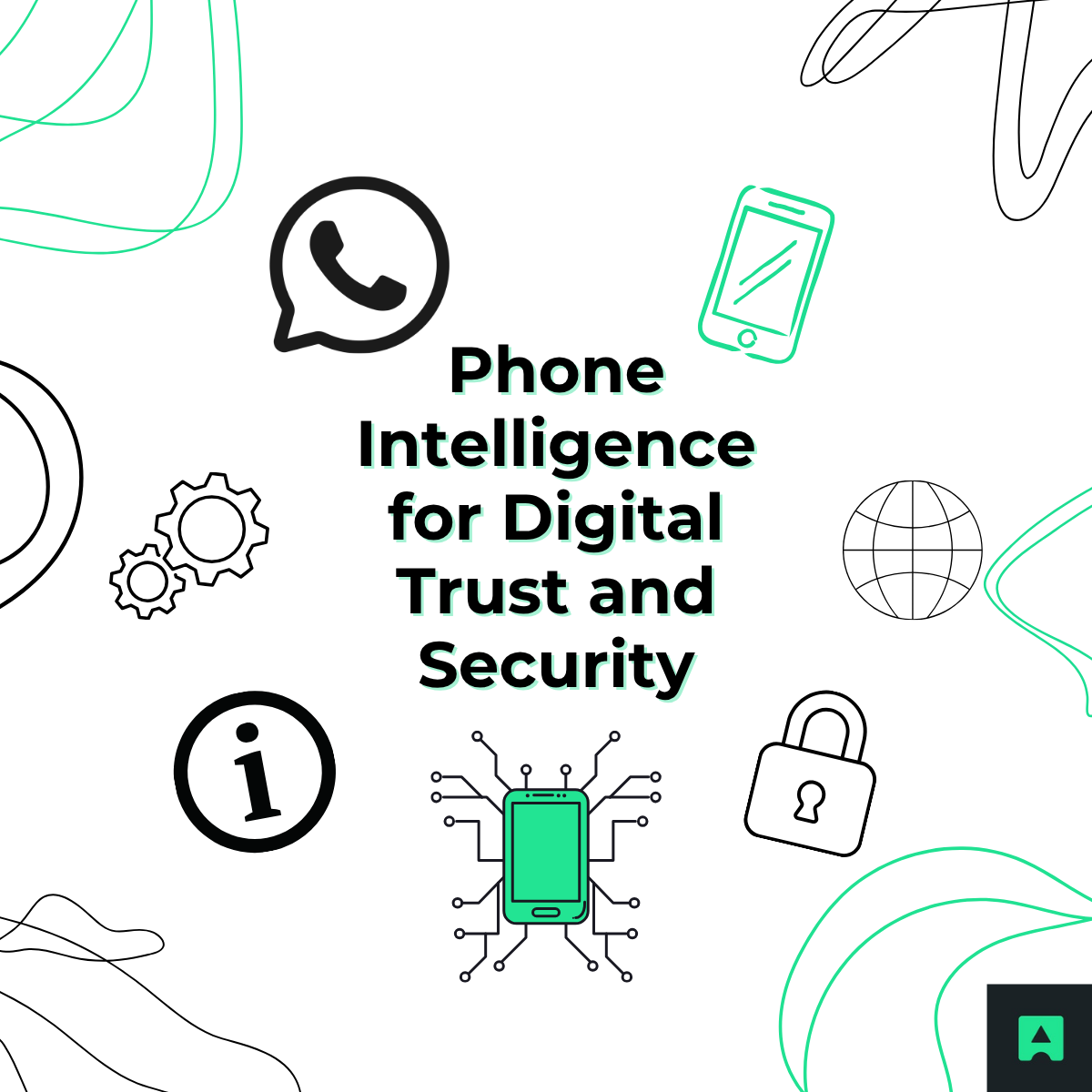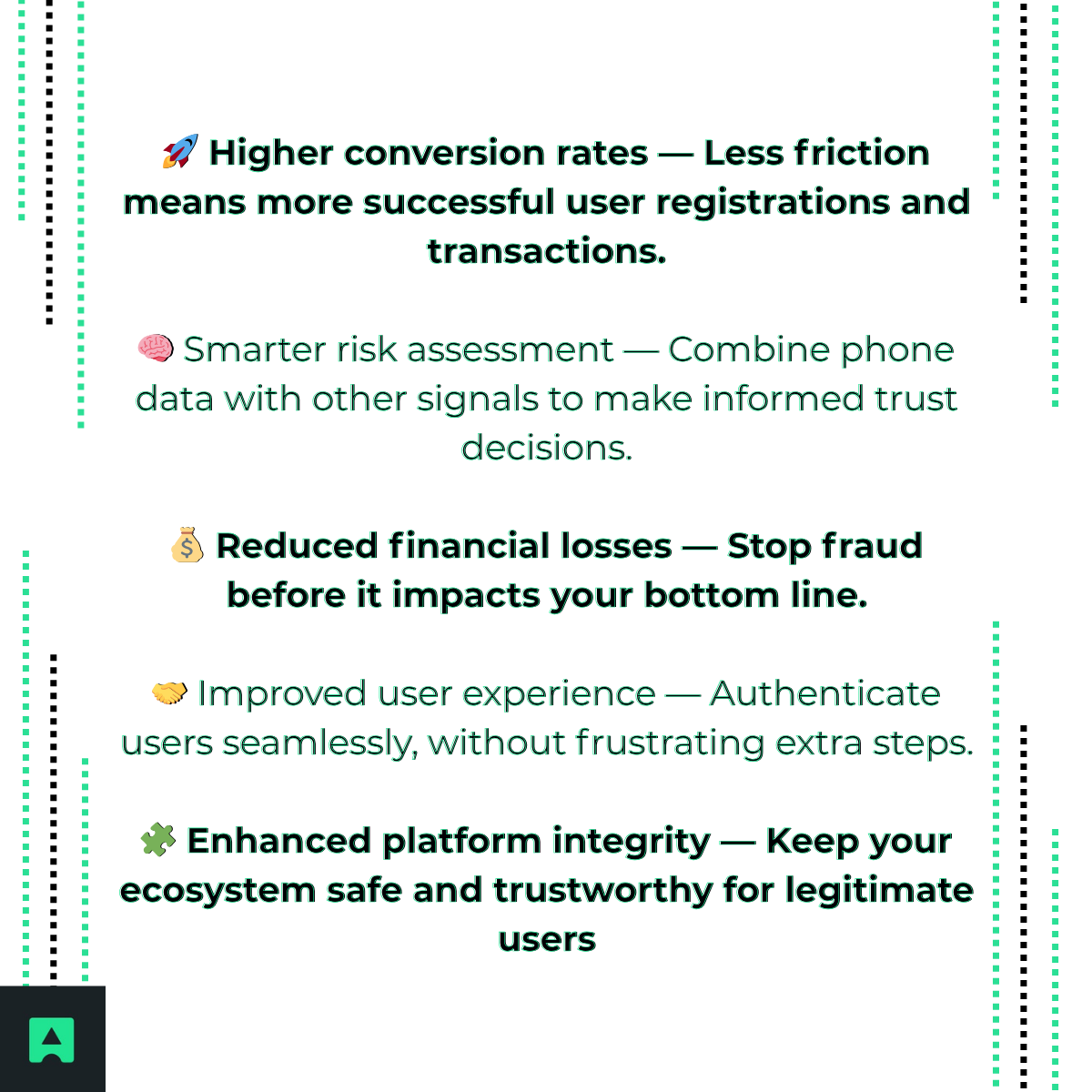🔒 Phone Intelligence for Digital Trust and Security
What It Is

At its core, phone intelligence refers to the process of analyzing telecom, device, and behavioral data linked to a phone number to determine if a user is genuine. Businesses use it to verify user identities, authenticate logins, and stop fraudulent activity before it starts.
In many cases, this technology is also referred to as:
- Mobile Intelligence, emphasizing the role of mobile network data
- Phone-Centric Identity Verification, highlighting the device as the foundation of digital trust
Unlike older verification methods that rely on passwords or manual document checks, phone intelligence leverages real-time, data-driven insights to assess risk instantly — reducing friction for legitimate users while catching bad actors in milliseconds.
How It Works: The Three Pillars of Trust
The power of phone intelligence lies in its ability to analyze complex, real-world signals that can’t easily be faked. These signals can be grouped into three fundamental pillars:
1. Possession 📱
Is the user actually in control of their device right now?
By validating device possession, systems can ensure that a login or transaction request is coming from the rightful owner’s phone — not a stolen number or spoofed identity.
2. Reputation ⭐
How trustworthy is the phone number itself?
A number that’s been active for years with stable carrier activity is generally more reliable than one that appeared only days ago or recently underwent a SIM swap. Phone reputation scoring helps businesses separate good users from potential fraudsters.
3. Ownership 👤
Does the number truly belong to the person claiming the identity?
Phone intelligence systems cross-check telecom data and user-provided information to verify ownership, ensuring that users can’t hijack someone else’s number or impersonate another account holder.
These three pillars work together to create a powerful digital fingerprint tied to a user’s most personal and persistent device — their phone.
The Signals: What Data Is Analyzed 📊
To make accurate decisions, phone intelligence systems rely on a wide range of signals and data attributes. These signals are collected and processed in real-time, often via APIs that connect to telecom and behavioral data sources.
Telecom Signals
- Phone line tenure: How long the number has existed and remained active
- Recent account changes: SIM swaps, number porting, or carrier changes
- Usage activity: Patterns in call, text, and data use that reveal normal or suspicious behavior
- Account type: Whether the number is prepaid, postpaid, or VoIP — key for fraud detection
Device & Behavioral Signals
- Device fingerprint: Operating system, browser version, screen size, and hardware characteristics
- Network and geolocation patterns: IP address stability, region consistency, and device mobility
- Behavioral biometrics: Typing cadence, touch pressure, or interaction speed unique to each user
These data points create a layered defense that’s both invisible to users and highly effective for security teams.
💼 Why Phone Intelligence Matters for Businesses
Real-World Use Cases
The modern digital ecosystem runs on trust — and phone intelligence has become a key component of building that trust at scale. Here’s how businesses are applying it today:
1. Frictionless Customer Onboarding 🧭
Traditional verification methods can slow users down with endless forms and manual checks. Phone intelligence allows companies to approve legitimate users instantly during signup, reducing abandonment rates and delivering a seamless onboarding experience.
2. Fraud Prevention 🛡️
Phone intelligence detects threats like account takeovers, SIM swap attacks, and synthetic identities before they cause damage. By continuously monitoring risk signals, it provides an early warning system for potential fraud attempts.
3. Modern Authentication 🔐
Tired of passwords and clunky SMS one-time codes? Phone-based identity verification offers a passive authentication layer that’s secure, user-friendly, and harder to spoof.
4. Regulatory Compliance (KYC/AML) 📜
Financial institutions, marketplaces, and fintech companies can use phone intelligence to comply with Know Your Customer (KYC) and Anti-Money Laundering (AML) regulations. It helps confirm that users are who they claim to be — without requiring invasive verification processes.
The Business Benefits
When integrated into your platform or application, phone intelligence delivers tangible results:

Phone intelligence doesn’t just protect your platform — it helps it grow, securely.
🤖 Phone Intelligence vs. On-Device AI
With tech giants like Apple and Google introducing AI-driven smartphone intelligence, it’s understandable that some confusion exists between these concepts.
On-Device AI (Consumer-Focused Intelligence)
This form of phone intelligence refers to the machine learning features that make devices smarter and more personalized. For example:
- ✨ Apple Intelligence can summarize notifications or assist with writing tasks.
- 💬 Smart Reply predicts your next text response.
- 🌍 Live Translate enables real-time multilingual communication.
- 📸 AI-enhanced photos improve automatically based on lighting and scene recognition.
These features are designed to enhance user experience, not to verify identity or assess risk.
Business Phone Intelligence (Security-Focused Intelligence)
In contrast, business-grade phone intelligence analyzes phone number and device data for trust and verification purposes. It focuses on ensuring that a user is real, active, and safe to engage with — an entirely different goal from consumer AI.
In short:
- On-device AI makes your phone smarter.
- Phone intelligence makes your business safer.
🛰️ The Government Context: Signals Intelligence (SIGINT)
The third meaning of “phone intelligence” originates from the national security domain.
Signals Intelligence (SIGINT) is the process of collecting and analyzing electronic signals — including phone calls, messages, and data transmissions — to support defense operations, counterterrorism, and espionage detection.
While SIGINT plays a critical role in global security, it’s completely separate from commercial phone intelligence. Businesses don’t have access to these government-level tools; instead, they use publicly available telecom data and behavioral insights to assess risk and confirm user identity.
This distinction matters: whereas SIGINT serves geopolitical intelligence, business phone intelligence serves digital trust.
🧭 Conclusion: The Future of Phone-Centric Identity
Although “phone intelligence” can describe multiple technologies, its most transformative impact lies in its role as a business enabler for secure, seamless user verification.
In an era where almost every digital interaction starts with a phone number — from signing up for apps to making transactions — the phone has become the most universal trust anchor.
By analyzing live phone and device data, companies can:
- Confirm user authenticity instantly
- Protect customers from fraud
- Maintain frictionless, positive user experiences
As online threats continue to evolve, phone-centric identity verification will become the foundation of secure digital ecosystems. Businesses that adopt it today are building a future of trust, transparency, and resilience. 🌐
🚀 Implement Phone Intelligence with AbstractAPI
Understanding the value of phone intelligence is only the first step. The next is implementation — and that’s where AbstractAPI makes it easy.
Abstract’s Phone Number Validation API gives you instant access to verified, structured phone data from around the world. With a single API call, you can:
✅ Validate phone numbers instantly to block fake signups and invalid entries.
🔍 Identify line type (mobile, landline, or VoIP) to assess account risk.
🌍 Access carrier and location data to strengthen fraud detection and improve onboarding flows.

Integrating Abstract’s API into your application is fast, scalable, and developer-friendly. Whether you’re building a fintech product, e-commerce site, or identity management platform, Abstract helps you create secure, seamless user experiences.
👉 Get started for free and see how phone intelligence can transform your security and trust strategy today.



